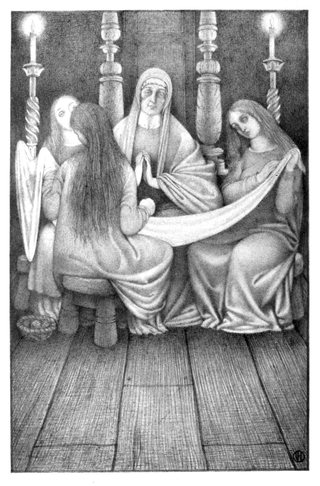
"Lord Randall", or "Lord Randal", is an Anglo-Scottish border ballad consisting of dialogue between a young Lord and his mother. Similar ballads can be found across Europe in many languages, including Danish, German, Magyar, Irish, Swedish, and Wendish. Italian variants are usually titled "L'avvelenato" or "Il testamento dell'avvelenato", the earliest known version being a 1629 setting by Camillo il Bianchino, in Verona. Under the title "Croodlin Doo" Robert Chambers published a version in his "Scottish Ballads" (1829) page 324.

"Matty Groves", also known as "Little Musgrave and Lady Barnard" or "Little Musgrave", is a ballad probably originating in Northern England that describes an adulterous tryst between a young man and a noblewoman that is ended when the woman's husband discovers and kills them. It is listed as Child ballad number 81 and number 52 in the Roud Folk Song Index. This song exists in many textual variants and has several variant names. The song dates to at least 1613, and under the title Little Musgrave and Lady Barnard is one of the Child ballads collected by 19th-century American scholar Francis James Child.
"Mary Hamilton", or "The Fower Maries", is a common name for a well-known sixteenth-century ballad from Scotland based on an apparently fictional incident about a lady-in-waiting to a Queen of Scotland. It is Child Ballad 173 and Roud 79.
"I Saw Three Ships (Come Sailing In)" is an English Christmas carol, listed as number 700 in the Roud Folk Song Index. The earliest printed version of "I Saw Three Ships" is from the 17th century, possibly Derbyshire, and was also published by William Sandys in 1833. The song was probably traditionally known as "As I Sat On a Sunny Bank", and was particularly popular in Cornwall.
John Strachan (1875–1958) was a Scottish farmer and Traditional singer of Bothy Ballads including several old and influential versions of the famous Child Ballads. He had a huge repertoire of traditional songs, and was recorded by the likes of James Madison Carpenter, Alan Lomax and Hamish Henderson.

"The Twa Sisters" is a traditional murder ballad, dating at least as far back as the mid 17th century. The song recounts the tale of a girl drowned by her jealous sister. At least 21 English variants exist under several names, including "Minnorie" or "Binnorie", "The Cruel Sister", "The Wind and Rain", "Dreadful Wind and Rain", "Two Sisters", "The Bonny Swans" and the "Bonnie Bows of London". The ballad was collected by renowned folklorist Francis J. Child as Child Ballad 10 and is also listed in the Roud Folk Song Index ., Whilst the song is thought to originate somewhere around England or Scotland, extremely similar songs have been found throughout Europe, particularly in Scandinavia.
"Young Beichan", also known as "Lord Bateman", "Lord Bakeman", "Lord Baker", "Young Bicham" and "Young Bekie", is a traditional folk ballad categorised as Child ballad 53 and Roud 40. The earliest versions date from the late 18th century, but it is probably older, with clear parallels in ballads and folktales across Europe. The song was popular as a broadside ballad in the nineteenth century, and survived well into the twentieth century in the oral tradition in rural areas of most English speaking parts of the world, particularly in England, Scotland and Appalachia.

"Lord Thomas and Fair Annet", also known as "Lord Thomas and Fair Eleanor", is an English folk ballad.

"Fair Margaret and Sweet William" is a traditional English ballad which tells of two lovers, of whom either one or both die from heartbreak. Thomas Percy included it in his folio and said that it was quoted as early as 1611 in the Knight of the Burning Pestle. In the United States, variations of Fair Margaret have been regarded as folk song as early as 1823.
The Farmer's Curst Wife is a traditional English language folk song listed as Child ballad number 278 and number 160 in the Roud Folk Song Index.
"The Knight and the Shepherd’s Daughter" is an English ballad, collected by Francis James Child as Child Ballad 110 and listed as number 67 in the Roud Folk Song Index.
"The Cruel Brother" is a folk song.
"Babylon" or "The Bonnie Banks o Fordie" is Child ballad 14, Roud 27.
Mr. Motherwell gives a version under the title of Babylon; or, the Bonny Banks o' Fordie; and Mr. Kinloch gives another under the title of The Duke of Perth's Three Daughters. Previous editors have attempted to find a local habitation for this tradition, and have associated it with the family of Drummond, of Perth. As a legend exactly similar is current in Denmark. this appears a bootless quest.

"The Twa Brothers" is a traditional ballad existing in many variants.
Johnie Cock is a traditional Scottish folk ballad, listed as the 114th Child Ballad and number 69 in the Roud Folk Song Index.
Willie Kemp, King of the Cornkisters is best known as a singer and writer of Doric comic songs. His family owned a hotel in Oldmeldrum, formerly Kemp's hotel, now Morris's and at an early age Kemp started performing at the hotel.

"The Derby Ram" or "As I was Going to Derby" is a traditional tall tale English folk song that tells the story of a ram of gargantuan proportions and the difficulties involved in butchering, tanning, and otherwise processing its carcass.
"One Morning in May" is an English folk song which has been collected from traditional singers in England and the USA and has also been recorded by revival singers. Through the use of double-entendre, at least in the English versions, it tells of an encounter between a grenadier and a lady.
"The Farmer's Boy" is a traditional English folk song or ballad, listed as number 408 in the Roud Folk Song Index. It has been arranged as a military march.
Brian Dawson was a British folk song collector, musician and singer.






